District of Columbia
Plea bargain in DC Trans murder case results in 8 year prison term
Under D.C. law, a conviction on a charge of voluntary manslaughter carries a possible maximum sentence of 30 years

WASHINGTON – A D.C. Superior Court judge on Friday sentenced two of four men originally charged with first-degree murder while armed for the July 4, 2016, shooting death of transgender woman Deeniquia “Dee Dee” Dodds on a street in Northeast Washington to eight years in jail and five years of supervised probation upon their release.
The sentence by Judge Milton C. Lee came a little over two months after Jalonta Little, 31, and Monte T. Johnson, 25, agreed through their attorneys to a plea bargain offer by prosecutors allowing them to plead guilty to a single count of voluntary manslaughter in exchange for the murder charge and related gun violation charges to be dropped.
The plea agreement included a promise by prosecutors with the Office of the United States Attorney for D.C. to ask the judge for a sentence of eight years incarceration. Under D.C. law, a conviction on a charge of voluntary manslaughter carries a possible maximum sentence of 30 years.
As expected by court observers, Lee gave Little and Johnson full credit for the time they have already served in jail since their arrest. Johnson has been held without bond for five years and six months since his arrest in the Dodds case in September 2016. Little has been held for four years and 10 months since the time of his arrest in February 2017.
Lee also agreed to a request by prosecutors to issue a court stay away order prohibiting Johnson and Little from going to the areas where they targeted Dodds and other trans women for armed robberies on the night of Dodds’ murder. Their targeting of trans women, some of whom were sex workers, prompted D.C. police to list the Dodds murder as a hate crime, a designation that was dropped by Lee during the 2019 trial on grounds of insufficient evidence.
Lee sentenced Johnson to an additional 150 days in jail for an unrelated charge, to which he pled guilty, of Attempted Unlawful Possession of Contraband into a Penal Institution. Court records show that Johnson and another inmate at the D.C. jail were charged in September of this year with actual possession of the illegal contraband after the two stabbed each other with make-shift, knife-like objects while fighting.
Court records show Johnson was treated at a hospital for multiple, non-life threatening stab wounds in connection with the incident. Prosecutors agreed to lower the charge to attempted possession of unlawful contraband in exchange for Johnson’s agreement to plead guilty. Lee ordered that the additional sentence for Johnson of 150 days must be carried out consecutively to the 8-year sentence for voluntary manslaughter.
Both Lee and Assistant U.S. Attorney Sharon Donovan, the lead prosecutor in the case, pointed out that Friday’s sentencing followed a March 2019 trial for Little and Johnson on the first-degree murder charges in the Dodds case that ended in a mistrial after the jury was unable to reach a verdict on the murder charges.
At the request of prosecutors, another trial for Little and Johnson on the murder was scheduled a short time later, but for reasons not disclosed in the public court records, the second trial was postponed several times and eventually cancelled after the plea bargain agreement was reached in September of this year.
The two other men charged in the Dodds murder, Shareem Hall, 27, and his brother, Cyheme Hall, 25, accepted a separate plea bargain offer by prosecutors shortly before the start of the 2019 trial for Johnson and Little in which they pleaded guilty to second-degree murder. They each testified as government witnesses at Johnson and Little’s trial, with Cyheme Hall testifying that it was Johnson who fatally shot Dodds in the neck at point blank range after she attempted to fight back when he and Johnson attempted to rob her.
Similar to Johnson and Little, the Hall brothers have been held without bond since the time of their arrests. They are schooled to be sentenced on Dec. 20.
The U.S. Attorney’s Office has not publicly disclosed why they chose to offer the plea deal rather than bring Little and Johnson to trial again on the murder charge. Attorneys familiar with criminal cases have said prosecutors sometime offer a plea deal after determining that going to trail a second time could result in a not-guilty verdict based on the circumstances of the case.
Lee raised this issue in Friday’s sentencing hearing when he asked prosecutor Donovan to explain the recommendation of an 8-year prison sentence rather than a longer one.
“Obviously, an individual lost their life during the circumstances that gave rise to the charge here in the first trial that we had,” Lee told Donovan. “Can you tell me why, from the government’s perspective, do you think this particular sentence here agreed upon by the parties — eight years — do you think it’s an appropriate sentence under the circumstances that we’re aware of?” Lee asked.
“Your honor, we believe that this takes into consideration the first trial and the evidentiary difficulties that were highlighted during the first trial and other incidents that occurred during the first trial,” Donovan told Lee. “And that taking everything into consideration and considering the goal of sentencing obviously is to address the family and the community by trying to cross the sentence against the facts and circumstances in a particular case,” Donovan said. “And we believe that taking all of that into consideration that it is an appropriate sentence.”
Prior to handing down his sentence, Lee also mentioned that he received a community impact statement on the Dodds murder from the D.C. Center for the LGBT Community’s Anti-Violence Project. The attorneys representing Little and Johnson said their clients saw the community impact statement. Neither of them raised any objections to the statement. The statement was not read or released at the hearing.
The Anti-Violence Project had not responded to a request by the Washington Blade last week for a copy of the statement as of the time of Friday’s hearing.
In a separate statement provided to the Blade last week, Anti-Violence Project Chair Stephania Mahdi expressed strong objections to the terms of the plea bargain offer by prosecutors.
“A plea bargain from first-degree murder to voluntary manslaughter as well as a reduction of years in sentencing from 30 to eight communicates not only a miscarriage of justice, but a message of penalization for victims who attempt to protect themselves during a violent assault,” Mahdi said. “The continual impact of reducing the culpability of perpetrators who target members of specifically identified communities sends a malicious message to criminals that certain groups of people are easier targets with lenient consequences,” she said.
District of Columbia
Trans employee awarded $930,000 in lawsuit against D.C. McDonald’s
Jury finds franchise failed to stop harassment, retaliation by staff

A D.C. Superior Court jury on Aug. 15 ordered a company that owned and operated a McDonald’s restaurant franchise in Northwest Washington to pay $930,000 in damages to a transgender employee who charged in a lawsuit that she was subjected to discrimination, harassment, and retaliation because of her gender identity in violation of the D.C. Human Rights Act.
The lawsuit, which was filed in January 2021 by attorneys representing Diana Portillo Medrano, says Medrano was first hired to work at the McDonald’s at 5948 Georgia Ave., N.W. in 2011 as a customer service representative and was recognized and promoted for good work until she began to transition as a trans woman two years later.
It says she was fired in 2016 after she filed a discrimination complaint with the D.C. Office of Human Rights on grounds that she did not have legal authorization to work in the U.S. as an immigrant from El Salvador. One of her attorneys, Jonathan Puth, said the jury agreed with the lawsuit’s allegation that the reason given for the firing was a “pretext” and the real reason was retaliation for her discrimination complaint.
Puth said evidence was presented during the eight-day civil trial that the McDonald’s had knowingly hired other immigrant employees who did not have legal authorization to work and never held that against them.
“Despite a successful five-year career with McDonald’s marked by raises, promotions, and awards and absence of discipline, Plaintiff Diana Medrano’s supervisors and co-workers subjected her to a barrage of taunts, laughter, ridicule, and harassment because she is a transgender woman,” the lawsuit states.
“Managers and supervisors routinely referred to her as male despite her expressed request that they respect her gender identity as female, encouraging co-workers to harass her relentlessly in like fashion,” it says. “When she complained to her managers, they claimed Ithat the harassment was justified because she hadn’t legally changed her name,” the lawsuit’s complaint continues.
“After she formalized and elevated her complaints, Defendants fired her on pretextual grounds. Defendants discriminated against Ms. Medrano because of her gender identity and retaliated against her in violation of the District of Columbia Human Rights Act,” the lawsuit complaint states.
The lawsuit names as defendants International Golden Foods LLC and MCI Golden Foods LLC, two companies based in Burke, Va. that it says were owned and operated by Luis Gavignano, who is also named as a defendant in the lawsuit. The lawsuit says the two companies held the franchise rights to own and operate the McDonald’s where Medrano worked.
The Washington Blade’s attempts to reach a spokesperson for the two companies and for Gavignano as well as two of the attorneys that represented them in contesting the lawsuit through email and phone messages were unsuccessful.
In a nine-page written answer to the lawsuit filed Feb. 12, 2021, on behalf of International Golden Foods, which is referred to as IGF, attorneys Amy M. Heerink and Kelvin Newsome dispute the allegations that Medrano was targeted for discrimination and harassment because of her gender identity.
The written answer to the complaint highlights the company’s claim that Medrano was fired because she didn’t have legal authority to work in the U.S. It refers to the company’s personnel official, Carla Vega, who informed Medrano that she could no longer work for the McDonald’s outlet.
“IGF admits that Ms. Vega informed Plaintiff that her employment had to be terminated due to Plaintiff’s voluntary and unprompted statement during the investigation that she was not authorized to work in the United States,” the written answer to the lawsuit states. “IGF admits that Plaintiff’s employment was terminated based on her ineligibility to work in the United States,” it says.
“The jury clearly found that IGF continually used unauthorized employees, hired and employed unauthorized workers knowingly,” Puth, Madrano’s attorney, told the Blade. “And they never fired anyone for that reason at any of their stores except for Diana,” Puth said.
“And so, the jury found that the reason given was a pretext for retaliation,” he said. “That was what was motivating them. They were motivated to retaliate against her because she kept complaining about discrimination.”
Puth noted that Medrano initially filed her complaint with the D.C. Office of Human Rights and was represented at that time by an attorney with Whitman-Walker Health’s legal clinic. He said Whitman-Walker later referred her to his law firm, Correia & Puth, after determining the case could not be resolved at the Office of Human Rights.
The jury’s verdict of $930,000 in damages included $700,000 in punitive damages and $230,000 in damages for the emotional distress Medrano suffered due to the discrimination and harassment to which she was subjected.
A statement released by the law firm representing her says the action by the jury is believed to be the first jury verdict in a transgender employment discrimination case under the D.C. Human Rights Act.
Attorney Puth and his law firm partner, attorney Andrew Adelman, were the attorneys of record representing Medrano in her lawsuit.
“When you are sure of what you have experienced, no matter how much time passes, the truth will come to light,” Medrano said in the statement released by her attorneys. “Our truth is our best weapon to achieve justice,” she said. “It is truth, justice, and faith in God that have helped me get here.”
In his law firm’s statement, Puth called the jury’s verdict a vindication of Medrano’s 11-year battle for her legal rights.
“Diana is our hero,” he said. “She stood up for her rights in the face of terrible harassment and kept fighting even after she was fired for doing so. This verdict puts other employers on notice that tolerating harassment of transgender employees is both unlawful and costly.”
Puth said earlier this year Medrano was approved for U.S. political asylum based on discrimination and harassment she faced in El Salvador. He said she is currently working full-time as a counselor for Empoderate, an LGBTQ health organization providing services for the Latina/Latino community that is affiliated with the D.C.-based La Clinica del Pueblo.
District of Columbia
Gender Liberation March participants rally for bodily autonomy outside Supreme Court, Heritage Foundation
‘Our bodies, our genders, our choices, our futures’

Upwards of 1,000 people gathered in D.C. on Saturday for the first-ever Gender Liberation March, rallying for bodily autonomy and self-determination outside the U.S. Supreme Court and the Heritage Foundation headquarters.
The march brought together advocates for transgender, LGBTQ, feminist, and reproductive rights, uniting the movements to protest attacks on healthcare access and individual freedoms.
The event kicked off just after noon at Columbus Circle, outside Union Station, where organizers had set up a stage. Throughout the day, speakers such as Elliot Page, Miss Major, and Julio Torres shared personal stories and highlighted the intersectional challenges of trans rights, abortion rights, and LGBTQ rights. Raquel Willis, a core organizer of the event, outlined the broad coalition of communities represented in the Gender Liberation March.
“This march is for the queers, and the trans folks of any age. It’s for the childless cat ladies and babies and gentlemen and gentlethem. It’s for the migrants and our disabled family. It’s for intersex folks and those living and thriving with HIV. It’s for Muslims and folks of every faith. It’s for those who believe in a free Palestine. It’s for our sex workers. It’s for our incarcerated and detained. It’s for all of us who believe there is a better way to live and love than we are today,” she told the crowd.
Nick Lloyd, an abortion storyteller from the organization We Testify, underlined the interconnectedness of the movements by sharing his experience as a trans man who had an abortion and discussing the support he received from trans women, emphasizing the significance of “radical solidarity.”
“When we fight for liberation, we need to make sure we are fighting for liberation for all of us,” he said in his speech.
The Gender Liberation March is organized by a collective of gender justice-based groups, including organizers behind the Women’s Marches and the Brooklyn Liberation Marches. Rachel Carmona, the executive director of the Women’s March, also addressed the importance of solidarity across movements.
She acknowledged that some within the feminist movement have questioned the inclusion of trans issues but countered this view.
“The women’s movement necessarily includes trans people,” Carmona asserted.
The march organized buses from nine East Coast cities, and many attendees arrived in D.C. in the days prior. Chris Silva and Samy Nemir Olivares left New York early that morning to make sure they could participate.
“I actually heard [about the march] from my dear friend, Samy, two weeks ago, and I got energized by the idea, and we woke up really early today to take a 5 a.m. bus and make it here this morning,” Silva said.
At 1 p.m. the crowd began marching toward the Supreme Court on a route that also passed by the Capitol. Marchers held signs and banners proclaiming “You can’t legislate us out of existence,” and “Our bodies, our futures.”
The Supreme Court has eroded individual liberties with recent decisions such as the overturning of Roe v. Wade, and is set to hear U.S. v. Skrmetti, a case with wide-reaching implications for trans healthcare, in October. Speaking through a speaker system in front of the Supreme Court, activist Aaryn Lang urged the crowd to remain vigilant.
“We do not have the luxury of treating very real threats like a difference of opinion. It’s not that type of time. They really want us dead,” Lang said.
Republican lawmakers in state legislatures are relentlessly attacking the rights of LGBTQ people, particularly trans individuals. This year alone, 70 anti-LGBTQ laws have been signed into law, most targeting trans rights, and at least 26 states have laws or policies banning gender-affirming care, according to the Human Rights Campaign.
From the Supreme Court, the march proceeded to the Heritage Foundation headquarters. The far-right think tank created the Project 2025 initiative, a blueprint to overhaul the federal government and attack trans and abortion rights under a potential second Trump administration.
Marchers chanted, “Abortion rights are trans rights,” as they approached the Heritage Foundation, where DJ Griffin Maxwell Brooks and booming music received them. The crowd quickly fell into an impromptu dance party and formed a circle where marchers took turns showcasing their vogueing. Trans queer performance artist Qween Amor noted that the march was attended by a group diverse in both identity and age.
“I think it’s very empowering to see not just my generation, but also seeing younger generations coming up and finding themselves in a moment where we can be liberated together and to see a mix of intersectional identities. I think, for me, [that] lets me know that, you know, I’m alive and that there’s hope,” she told the Washington Blade.
The march then returned to Columbus Circle, where health organizations and political organizations had set up booths. Hundreds of banned books were distributed for free and all copies were claimed within two hours of the event’s start.
It was a particularly hot Saturday with temperatures reaching 87 degrees, but Columbus Circle continued to be filled with people late into the day.
Page, known for his roles in films and series such as “Juno” and “The Umbrella Academy,” drew a large crowd when he took the stage to speak about his journey as a trans man.
“When I was finally able to step back from the squirreling, foreboding, the self-battering, and torment, the messages to lie and hide grew faint. I was able to listen, at last, to embrace myself wholly. And goodness, do I want that feeling for everyone,” he said. “I love being trans. I love being alive, and I want everyone to have access to the care that has changed my life. So let’s fight for it.”

Máxima Mauricio Rodas, a transgender Latina activist and sex worker, participates in the Gender Liberation March that took place in D.C. on Sept. 14, 2024. (Washington Blade photo by Erkki Forster)
District of Columbia
Suspect shatters window next to entrance door at HRC building
D.C. police report says incident not listed as hate crime
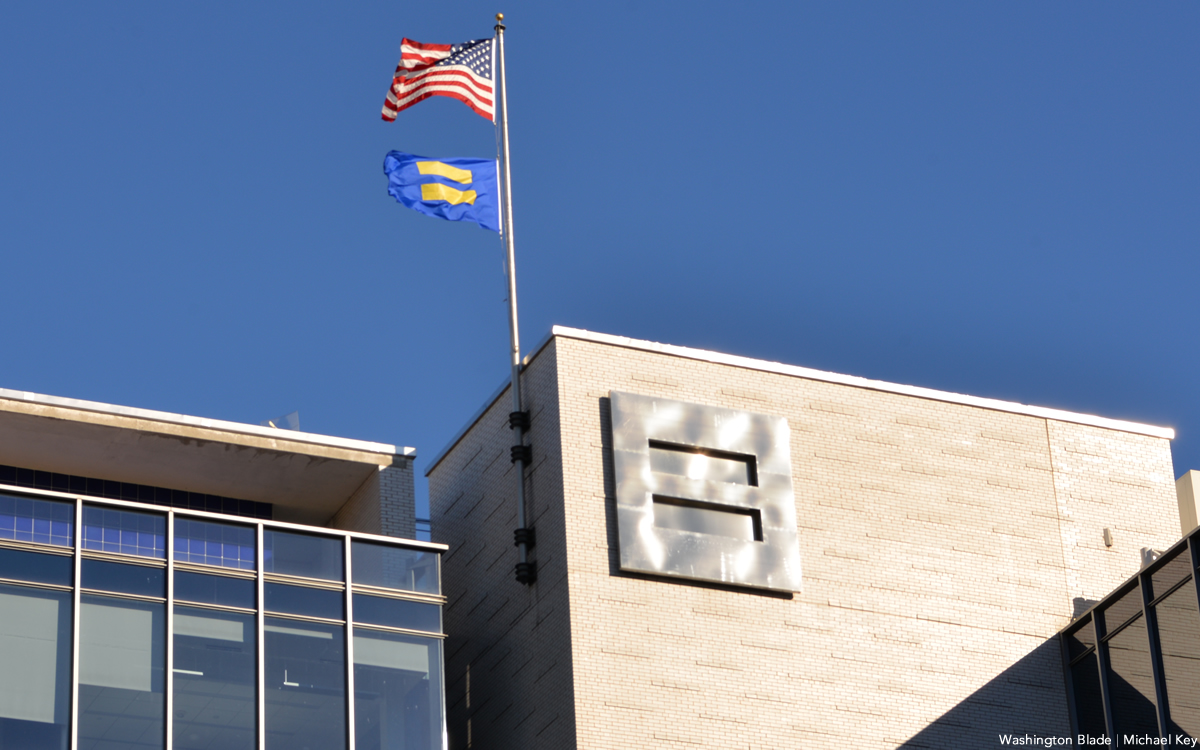
An unidentified male suspect on Aug. 4 threw a baseball-sized rock into a large glass window located next to the main entrance door of the Human Rights Campaign’s headquarters building at 1640 Rhode Island Ave., N.W., according to a D.C. police report.
The report, which lists the incident as a misdemeanor crime of Destruction of Property, provides a description of the suspect but does not say whether anyone witnessed him breaking the window. It says police received a call for the destruction of property at the eight-story tall HRC building at approximately 2:15 a.m.
“At 0212 hours [2:12 a.m.], Suspect 1 approached the outside perimeter of 1640 Rhode Island Avenue, NW at the Human Rights Campaign building and threw a baseball sized rock at a window next to the door to the building,” the police report says. “The window received significant damage causing multiple cracks from the base of the window to the top of the window,” it says.
“Suspect 1 then walked away from the location heading eastbound on Rhode Island Avenue NW wearing a white t-shirt, tan baseball cap, black pants, black and white shoes while carrying a dark colored bookbag,” the report concludes.
D.C. police reports for this type of crime almost always state whether one or more witnesses were present at the time the crime was committed. The fact that no witnesses are mentioned in the report while a detailed description of the suspect is given suggests that police had access to a video recording of the incident taken by a security camera on or near the HRC building.
The report also states that the incident has not been classified as a suspected hate crime.
In response to a Blade inquiry, D.C. police spokesperson Paris Lewbel said he was reaching out to police officials who know something about the incident, but he did not provide additional information as of Wednesday morning, Sept. 4.
In response to a request by the Blade for comment from HRC, including whether HRC provided police with video footage of the incident, HRC spokesperson Jarred Keller said he was reaching out to HRC officials for information about the incident. But he also did not provide a response as of Wednesday morning.
The Blade learned about the HRC window-breaking incident a little over a week ago, more than two weeks after it happened on Aug. 4, through a tip from an HRC volunteer.
On its website HRC says its headquarters building, which first opened in 2003, “provides ample workspace for HRC’s staff of more than 150,” also houses HRC’s Equality Center, a meeting and event space available for rent, as well as the HRC Media Center, a multimedia production facility.
“This building is an important symbol for all who visit the nation’s capital – a constant reminder to our LGBTQ+ community, as well as anti-LGBTQ+ activists, that HRC will not stop until the LGBTQ+ community is ensured equality,” a statement on the website says.

District of Columbia
D.C. gay man attacked, beaten by Shake Shack staff
Victim says assault came after he and boyfriend kissed
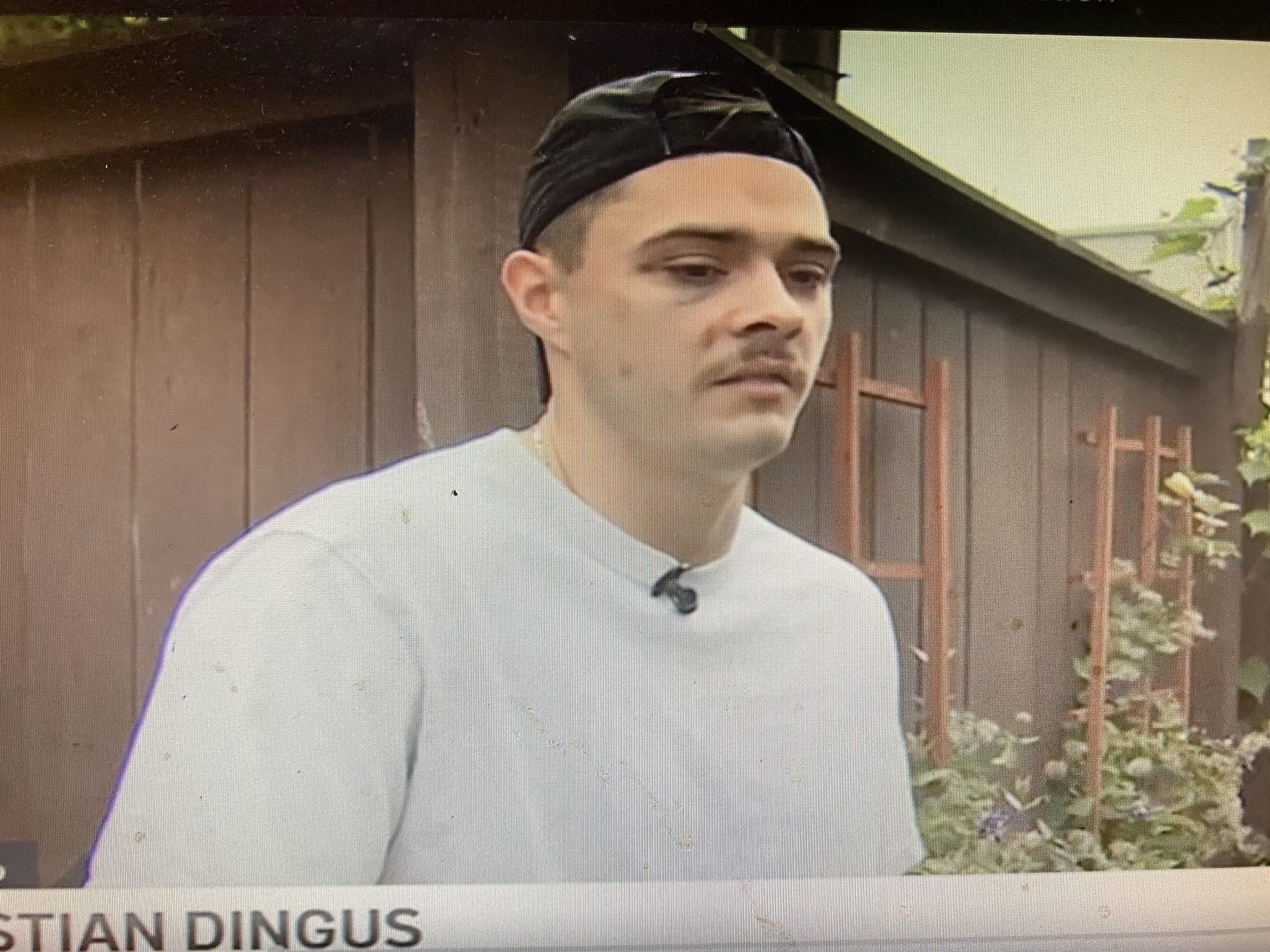
D.C. police are investigating as a suspected hate crime an incident in which a gay man says he was attacked and beaten by four or five employees of the Dupont Circle Shake Shack restaurant on Saturday, Aug. 17, after he and his male partner kissed each other while waiting for their food order.
District resident Christian Dingus, 28, told the Washington Blade the attack came after he tried to defuse an argument between his partner and one of the Shake Shack employees who told the two men not to kiss each other. Dingus said it started inside the popular food establishment and moved outside a side door where several employees knocked him down onto the sidewalk and repeatedly punched and kicked him.
He says after he was knocked down, he positioned himself in a “fetal position” on the sidewalk and remembers being repeatedly punched and hit in the head and body by four or five attackers.
The incident was captured on video taken by another Shake Shack customer on her cell phone, and which has been posted on social media, including Facebook. Although the faces of the attackers and of Dingus and his partner are not clearly visible on the dramatic video, it provides a vivid view of a man being knocked to the ground and being assaulted by several other men who are seen running out the door and attacking Dingus.
Dingus said he declined an offer to take him to a hospital when an ambulance arrived after police also arrived on the scene. But he said a friend took him to a hospital later that day after he experienced intense pain in his jaw, which was severely bruised but was not broken. He said he was released from the hospital the next day and continues to recover from multiple bruises to the head, face, and body.
A D.C. police report says one of the alleged attackers, identified as Suspect 1, told police that Dingus, identified in the report as Victim 1, “placed his hands” on the suspect’s neck. “Suspect 1 advised that he was defending himself,” the report says.
Dingus called that claim by the suspect a complete falsehood, saying he never touched any of the employees who attacked him.
In response to a request from the Blade for comment, a Shake Shack spokesperson sent the Blade a statement saying employees have been suspended as Shake Shack continues to cooperate with a D.C. police ongoing investigation into the incident.
“We are aware of the incident on Saturday, Aug. 17, involving team members and a guest at our Dupont Circle location and are taking it very seriously,” the statement says. “At Shake Shack, the safety and well-being of our guests and team members are our top priority, and we have a zero-tolerance policy for any form of violence,” it says.
“We are fully cooperating with local authorities in their investigation and have suspended the team members involved pending further review,” the statement continues. “We are committed to taking the appropriate action based on the findings.”
The Shake Shack where the incident took place is located at 1216 18th St., N.W., which is at the intersection of Connecticut Avenue, 18th Street, and Jefferson Place. The police report says the assault took place on Jefferson Place, where a Shake Shack’s side door entrance is located.
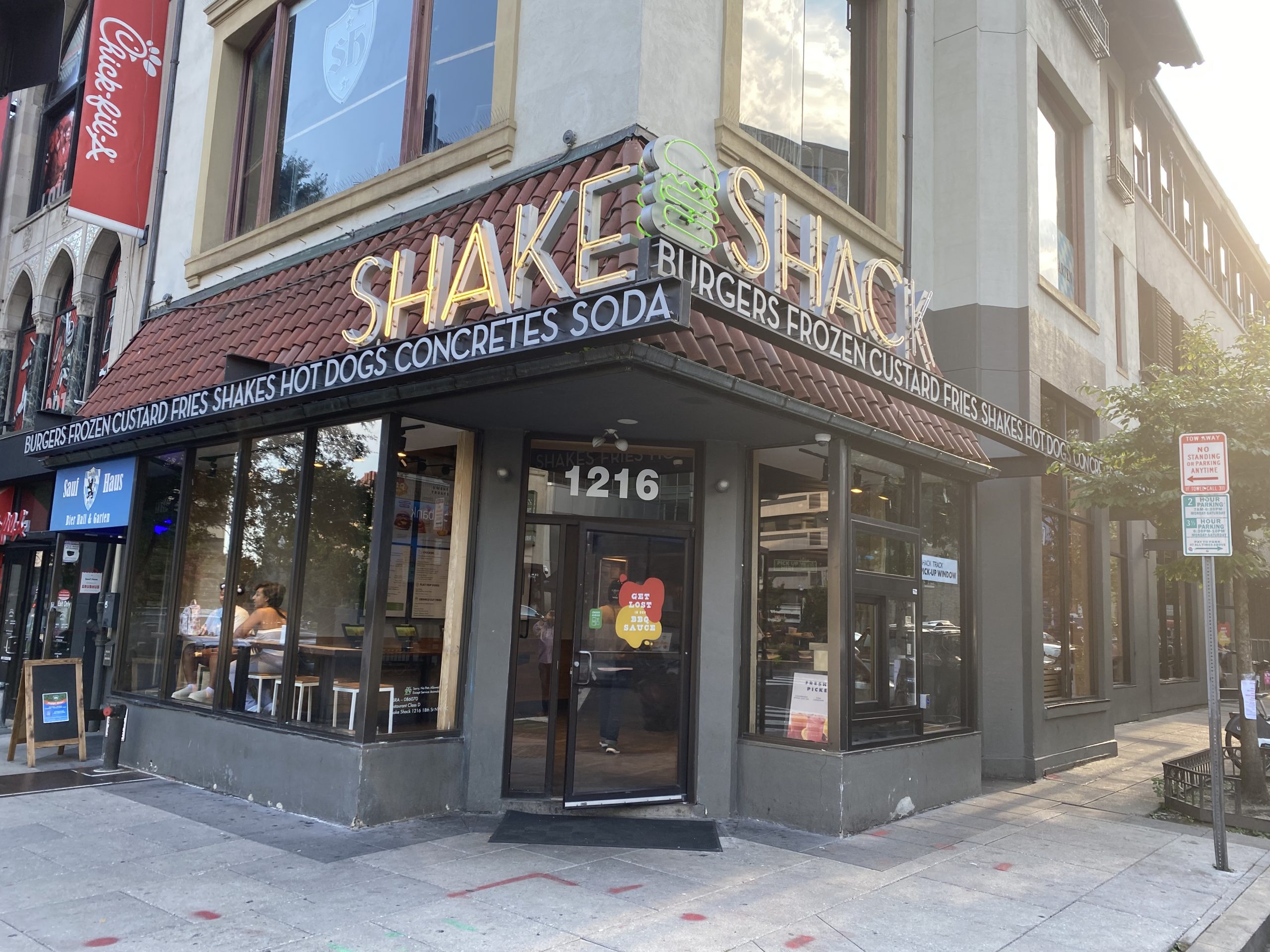
The police report lists the incident as a “simple assault” and “suspected” hate crime. It shows that no arrests had been made as of the time the report was prepared on Aug. 17. Dingus said police asked him if he wanted to press charges against the men who assaulted him and he told them yes, “definitely,” he told the Blade.
With all the attackers being Shake Shack employees, Dingus said he was concerned that no arrests were made while police were on the scene speaking with him and witnesses.
D.C. police spokesperson Paris Lewbel told the Blade on Monday the incident remains under investigation. “All facts and evidence in the case will be presented to the United States Attorney’s Office for a determination on charges,” he said.
Dingus said the Shake Shack employees targeted him after he tried to defend his partner, who he believed was being threatened by the employees. “I started yelling at them, saying you have no right to do this. Leave him alone,” he said. “At that point I was pushed very forcefully, and really from that moment all five of them were coming at me. They were pushing me and punching me in my head,” he said.
“And then I got pushed, thrown to the ground,” he told the Blade. “At that point I covered my head and kind of went into the fetal position. And they just continued to punch me in my head and my side and my face.”
District of Columbia
Founder of now-defunct D.C. LGBTQ group pleads guilty to wire fraud
Reduced charge says Ruby Corado stole at least $150,000 in COVID-relief funds
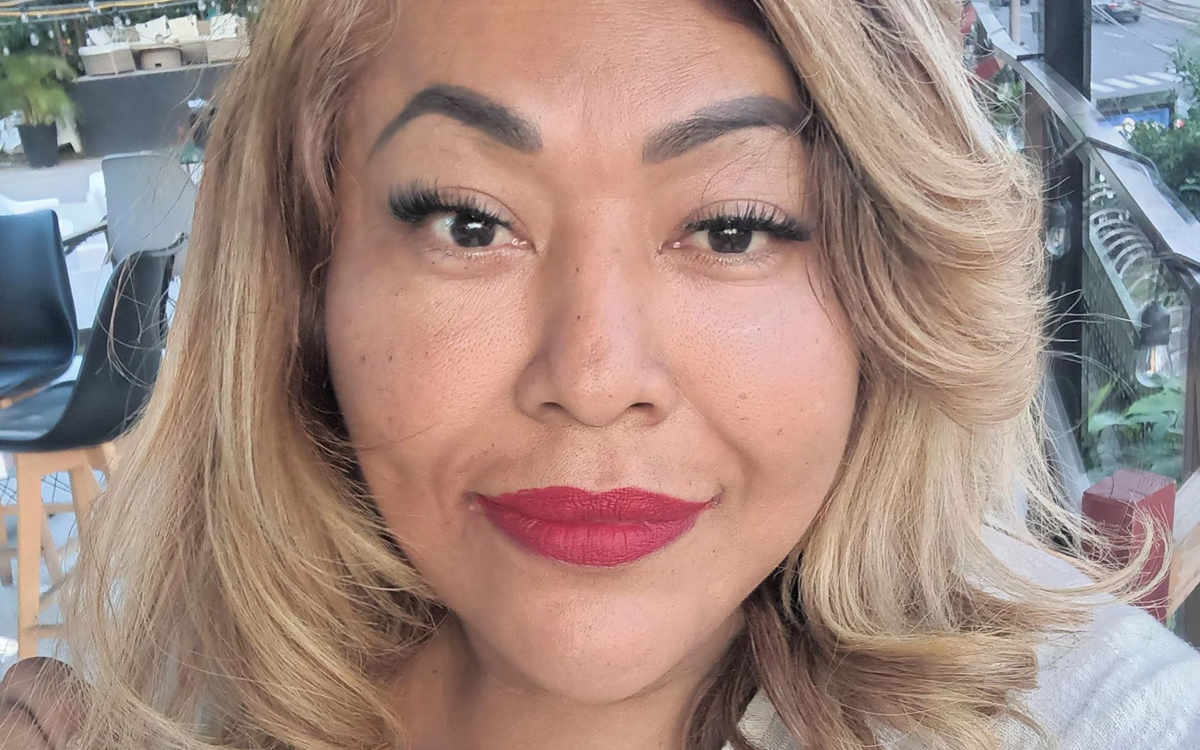
Ruby Corado, the founder and executive director of the now-defunct LGBTQ community services organization Casa Ruby, pleaded guilty Wednesday to a single charge of wire fraud as part of a plea bargain deal offered by prosecutors with the Office of the U.S. Attorney for the District of Columbia.
The charge to which she pleaded guilty in U.S. District Court for D.C. says she diverted at least $150,000 “in taxpayer-backed emergency COVID relief funds to private off-shore bank accounts for her personal use,” according to a statement released by the U.S. Attorney’s office.
Court records show that U.S. District Court Judge Trevor N. McFadden, who is presiding over the case, has scheduled a sentencing hearing for Jan. 10, 2025.
Corado’s guilty plea came a little over six weeks after prosecutors on May 31 filed a one-count criminal information charge of wire fraud against her that replaced an earlier criminal complaint charging her with bank fraud, money laundering, monetary transactions in criminally derived proceeds, and failure to file a required report of a foreign bank account.
The earlier complaint was filed at the time the FBI arrested Corado on March 5 of this year at a hotel in Laurel, Md., shortly after she returned to the U.S. from El Salvador. The initial complaint, like the new criminal information that replaced it, accused Corado of diverting at least $150,000 of federal pandemic relief funds to her own bank accounts in El Salvador. The charges say the funds were intended for use by Casa Ruby to support indigent LGBTQ clients in need of housing and other support services.
At the request of Corado’s court-appointed attorney and against the wishes of federal prosecutors, who said Corado would be a flight risk, another judge agreed to release Corado into the custody of her niece in Rockville, Md., under a home detention order. The release order came seven days after Corado had been held in jail since the time of her arrest on March 5.
In addition to a prison sentence, the charge of wire fraud also includes a possible penalty of financial forfeiture for which Corado could be required to pay restitution to the government. The plea agreement filed in court includes this statement to Corado’s attorney: “Specifically, your client agrees to the entry of a forfeiture money judgment in an amount ordered by the court, which is equal to the value of any property which constitutes or is derived from proceeds traceable to the offense in Count One of the Information in which your client is pleading guilty.”
However, legal observers have said that under a plea agreement like the one offered to Corado, prosecutors most likely will ask the judge for a lesser sentence. Corado’s attorney is also expected to point out that this is a nonviolent, first-time offense for Corado, which merits a lesser sentence.
Corado has denied wrongdoing in her operation of Casa Ruby in response to a separate civil complaint filed against her and Casa Ruby by the Office of the D.C. Attorney General. That complaint is still pending in D.C. Superior Court.
In its July 17 statement the U.S. Attorney’s office refers to court documents showing that Corado, “on behalf of Casa Ruby, received more than $1.3 million from the Paycheck Protection Program and the Economic Injury Disaster Loan program.” The statement adds, “Instead of using the funds as she promised, Corado stole at least $150,000 by transferring the money to bank accounts in El Salvador, which she hid from the IRS.”
The statement says that in 2022, “when financial irregularities at Casa Ruby became public, Corado sold her home in Prince George’s County and fled to El Salvador.” It says FBI agents arrested her at the hotel in Laurel, Md. on March 5 “after she unexpectedly returned to the United States.”
District of Columbia
Fentanyl dealer, distribution charge in deaths of two D.C. gay men
When the cause and manner of death were disclosed by the Medical Examiner, D.C. police said the investigation into the deaths remained open
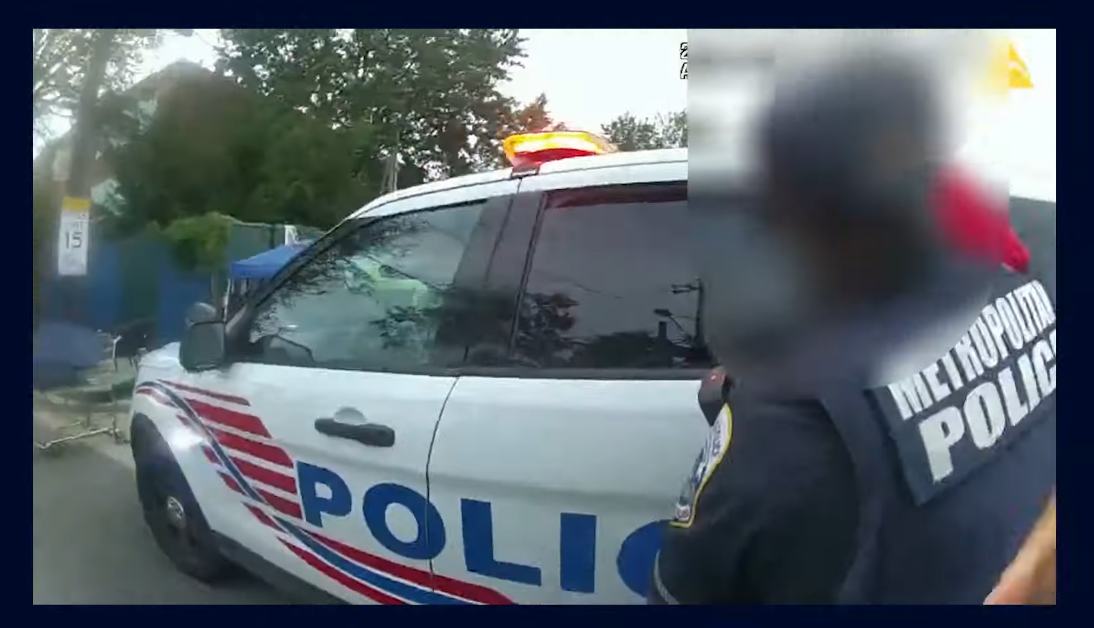
WASHINGTON – The Office of the U.S. Attorney for D.C. has announced that federal prosecutors on June 13 obtained an indictment against one of two D.C. brothers previously charged with multiple counts of illegal drug distribution that now charges him with “distributing cocaine and fentanyl” on Dec. 26, 2023, that resulted in the deaths of D.C. gay men Brandon Roman and Robert “Robbie” Barletta.
In a June 13 press release, the U.S. Attorney’s Office said Jevaughn ‘Ledo’ Mark, 32, is charged in a new “secondary superseding indictment” linked to the Roman and Barletta deaths. It says he and his brother, Angelo Mark, 30, “previously were charged on April 9 in a 17-count superseding indictment for participating in a conspiracy that distributed large amounts of fentanyl and cocaine in the metropolitan area.”
The press release says Jevaughn Mark is currently being held without bond on charges that include eight counts of unlawful distribution of fentanyl, cocaine, and heroin and distributing 40 grams or more of fentanyl between Jan. 10, 2024, and March 13, 2024. According to the press release, the charges were based on six illegal drug purchases from Jevaughn Mark by undercover U.S. Drug Enforcement Administration and undercover D.C. police officers.
Court records show that Angelo Mark was charged in a criminal complaint on March 22 with multiple counts of conspiracy to distribute narcotics and is also being held without bond.
D.C. police and Fire and Emergency Medical Services reports show that Roman, 38, a prominent D.C. attorney and LGBTQ rights advocate, and Barletta, 28, a historic preservation expert and home renovation business owner, were found unconscious when police and emergency medical personnel responded to a 911 call and arrived at Barletta’s home on Dec. 27. The reports show that Roman was declared deceased at the scene and Barletta was taken to Washington Hospital Center where he died on Dec. 29.
A police spokesperson told the Washington Blade in February that police were investigating the Roman and Barletta deaths, but investigators had to wait for the D.C. Medical Examiner’s official determination of the cause and manner of death before the investigation could fully proceed.
Both men were patrons at D.C. gay bars and their passing prompted many in the LGBTQ community to call for stepped up prevention services related to drug overdose cases, even though the cause and manner of death for the two men was not officially determined until early April.
In April, the D.C. Office of the Chief Medical Examiner disclosed that the cause of death for both men was an accidental consumption of several drugs that created a fatal “toxic” effect. The Medical Examiner’s office said Barletta’s death was linked to the consumption of at least four different drugs and Roman’s death was caused by the “combined toxic effect” of six drugs. The Medical Examiner’s office disclosed that cocaine and fentanyl were among the drugs found in the bodies of both men. And for both men, the manner of death was listed as “Accident/Intoxication.”
When the cause and manner of death were disclosed by the Medical Examiner, D.C. police spokesperson Tom Lynch said the police investigation into the deaths remained open but said, “There are no updates on the investigation that we are ready to release to the public.”
But the Medical Examiner’s findings prompted Johnny Bailey, the community outreach coordinator for HIPS D.C., an LGBTQ supportive organization that provides services and support for those who use recreational drugs, to say he strongly believed that Barletta and Roman did not intentionally consume some of the drugs found in their system.
“I’m going to say I do believe this was a poisoning,” Bailey told the Blade. “I think it is unfair to call some things an overdose because an overdose is when you do too much of a drug and you die from that drug,” he said. “This is like if you have a few glasses of wine every night and someone puts arsenic in your wine, no one would be like, ‘oh, they drank themselves to death.’ They were poisoned. And that’s what I think is happening here,” he said in referring to Barletta and Roman.
In announcing the new charges against Jevaughn Mark that link him to Barletta and Roman’s deaths, the U.S. Attorney’s press release discloses that he supplied fentanyl in the drugs he sold unknowingly to the undercover DEA and D.C. police officers when one of the officers, posing as a drug buyer, did not ask for fentanyl.
“In each instance, the DEA/MPD agents requested to buy ‘Special K’ or Ketamine from Jevaughn Mark,” the press release says. “In every instance, Jevaughn Mark supplied a mixture of fentanyl and other substances, including heroin, but not ketamine,” it says.
The release says that after the earlier indictment against Jevaughn Mark was issued, law enforcement agents conducted a search of his Southeast D.C. home and “recovered two firearms, cocaine, fentanyl, about $38,000 in cash, body armor vests, and drug trafficking paraphernalia.” It says on that same day authorities executed another search for a second residence linked to Jevaughn Mark, where they located a bedroom used by his brother Angelo Mark.
“From Angelo Mark’s bedroom, law enforcement recovered seven firearms, 900 rounds of ammunition, dozens of pills, cocaine, fentanyl, drug trafficking paraphernalia, and about $50,000 in cash,” the press release says, adding, “Based on the evidence, both brothers were indicted in the first superseding indictment.”
District of Columbia
Douglas Emhoff & Billy Porter kick off Capital Pride festivities
Nationally acclaimed singer Billy Porter, who performed the next day at the Capital Pride festival, also spoke at the press conference

WASHINGTON – Douglas Emhoff, the husband of U.S. Vice President Kamala Harris, who has the title of Second Gentleman, was among the speakers at a press conference on Saturday, June 8, at the location of the start of D.C.’s Capital Pride Parade that was called by Capital Pride organizers.
Emhoff and nationally acclaimed singer Billy Porter, who performed the next day at the Capital Pride festival and concert, and who also spoke at the press conference, each emphasized the importance of the LGBTQ rights movement at a time when lawmakers in states across the country are pushing legislation to curtail LGBTQ rights.
“It’s great to be here again to enjoy the ambiance and to celebrate with the generations of LGBTQ+ Americans who have fought for their right to live openly and proudly and authentically,” Emhoff told those attending the press conference, which included Capital Pride officials and supporters.
“I love coming to Pride,” Emhoff said. “I was here with my wife, your vice president, in 2021, when she became the first sitting vice president ever to march in a Pride parade. We go to Pride parades all over – San Francisco, L.A., and love doing it,” he said.
Porter joined Emhoff at the press conference urging people to vote “blue” in the November election.
“I don’t care who you are. I don’t care where you come from,” he said. “It’s an election year and our democracy is at stake, period,” he continued. “There is one choice. That choice is for democracy. Vote blue down the ticket,” he said, referring to Democratic Party candidates.
“The one thing I will say as a 54-year-old Black queer man who came out in the ’80s at the beginning of the AIDS crisis, is that I’ve lived long enough to know that love always wins,” said Porter. “I’ve lived long enough to have seen the circle of life play out in our favor,” he said.

Others who spoke at the press conference included Kenya Hutton, deputy director of the Center for Black Equity, the group that organizes D.C.’s annual Black Pride events; Ryan Bos, executive director of Capital Pride Alliance, the group that organizes most of D.C.s Pride events; Ashley Smith, chair of the Capital Pride Alliance Board; and Bernie Delia, co-chair of the World Pride Steering Committee.
Bos and Smith provided details about the parade, festival, and concert during the 2024 Capital Pride weekend, while Delia provided details about World Pride 2025, the international Pride celebration that D.C. and Capital Pride Alliance were selected to host in June 2025.
Hutton said the Center for Black Equity is excited to be working with Capital Pride Alliance on plans for World Pride 2025, when the Black Pride events will be the kickoff events for World Pride. “We are especially proud of partnering with Capital Pride Alliance in organizing the World Pride Human Rights Conference,” he said.
Also speaking at the press conference were Theresa Belpulsi, Senior Vice President of Tourism, Sports, and Visitor Services for Destination D.C.; and Angie Gates, president and CEO for Events D.C. The two organizations promote tourism and business events such as conventions in D.C. and are playing a lead role in helping to promote World Pride 2025, the two said.
“Right now, our estimations are that we will see over two million visitors coming to Washington, D.C. for World Pride,” Belpulsi said at the press conference. “And that does not include our local families that are here,” she said. “What that actually means is and why this matters is the economic impact is over $787 million to Washington, D.C. over two weeks.”
Delia, who introduced D.C.’s Wanda Alston Foundation executive director June Crenshaw as his co-chair of the World Pride Steering Committee, said the committee has been “working diligently to guarantee the World Pride celebration showcases the best of the national capital region and the best of the United States.”
He said that in addition to the parade, festival, and concert, World Pride events will include the human rights conference mentioned by Hutton, a sports festival, a rally at the Lincoln Memorial, a march on Washington, a music festival, and an international choral festival managed by the Gay Men’s Chorus of Washington.
In his remarks at the press conference, Emhoff told of his wife’s long record of support for the LGBTQ community in her past role as District Attorney in San Francisco, as California’s Attorney General, and as a U.S. senator from California.
Covering the @CapitalPrideDC Capital Pride Parade for @washblade . Billy Porter speaking at a press conference before the parade. #Pride #LGBTQ pic.twitter.com/pkYaenQ0n2
— Michael Patrick Key (@MichaelKeyWB) June 8, 2024
“And now as vice president, she and Joe Biden are responsible for the most pro-LGBTQ+ administration in history,” he said. “And all that goes away if Donald Trump wins in November. We can’t let that happen, right?” Many in the crowd of Capital Pride supporters and volunteers attending the press conference shouted, “That’s right.”
“So, make no mistake,” Emhoff replied. “The upcoming election is about your freedom and your rights,” he said, adding, “My message today is simple. You are not alone. We are here for you. …We love you for who you are and we’re fighting right beside you. And together we are going to win this election and we are going to protect our freedoms. Thank you.”
District of Columbia
International Trans Day of Visibility events take place in D.C.
The events on Sunday served as demonstrations of solidarity within the trans community & a call to action for continued advocacy
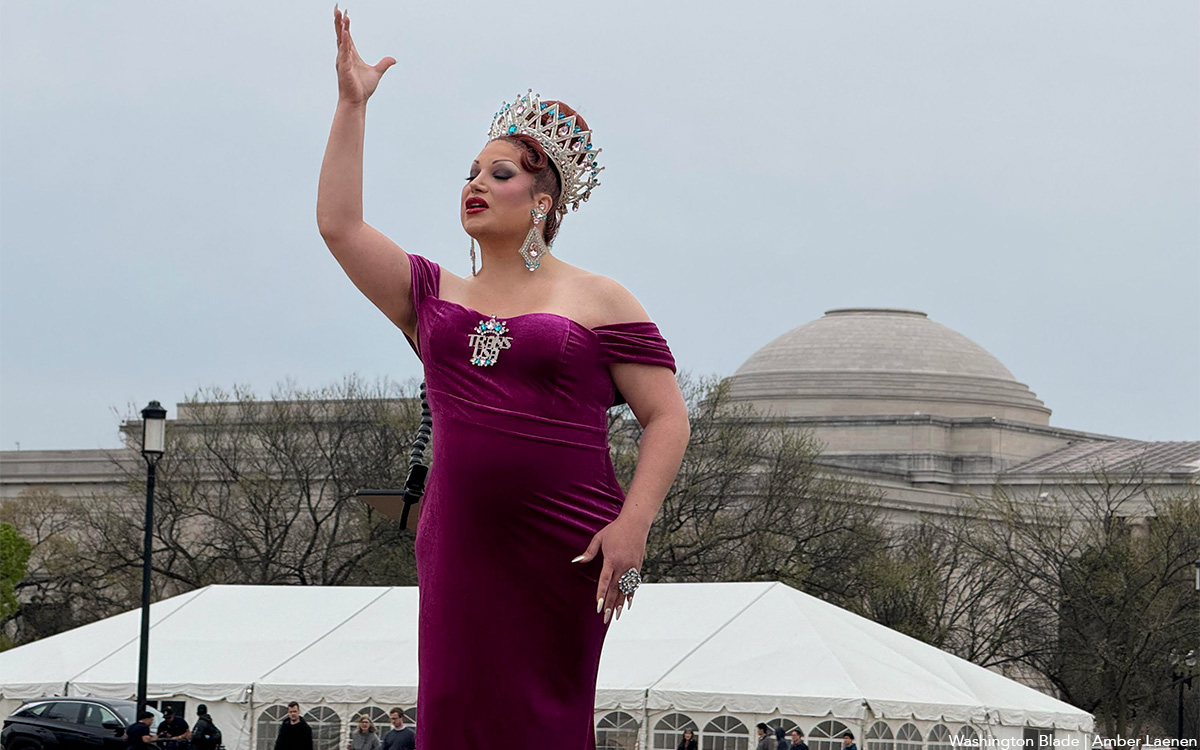
By Amber Laenen | WASHINGTON – The nation’s capital on Sunday hosted a series of events coordinated by Trans USA National Pageantry and the National Center for Transgender Equality to honor the International Transgender Day of Visibility.
One of the day’s main events was the TRANSform the Vote rally, which took place on the National Mall.
Organized by the National Center for Transgender Equality in partnership with Queer Equity Institute, the rally aimed to bring together individuals from all walks of life to celebrate transgender liberation, address issues of violence against the trans community and promote civic engagement. Elected officials, activists, and artists who participated emphasized the importance of unity and advocacy within the trans community.
TRANSform the Vote initiative is a nationwide movement of trans people and allies who want to make their voices heard at the ballot box.
Queer Equity Institute Executive Director Leigh Finke and Minneapolis City Council President Andrea Jenkins were among those who spoke at the rally. Renowned actress, advocate, singer and TRANSTech CEO Angelica Ross also took the stage.
“Today we are here to transform the vote, there are so many trans people who are right now preparing to run, who have been running for office and we as a community have to be prepared to propel them into office,” said Ross.
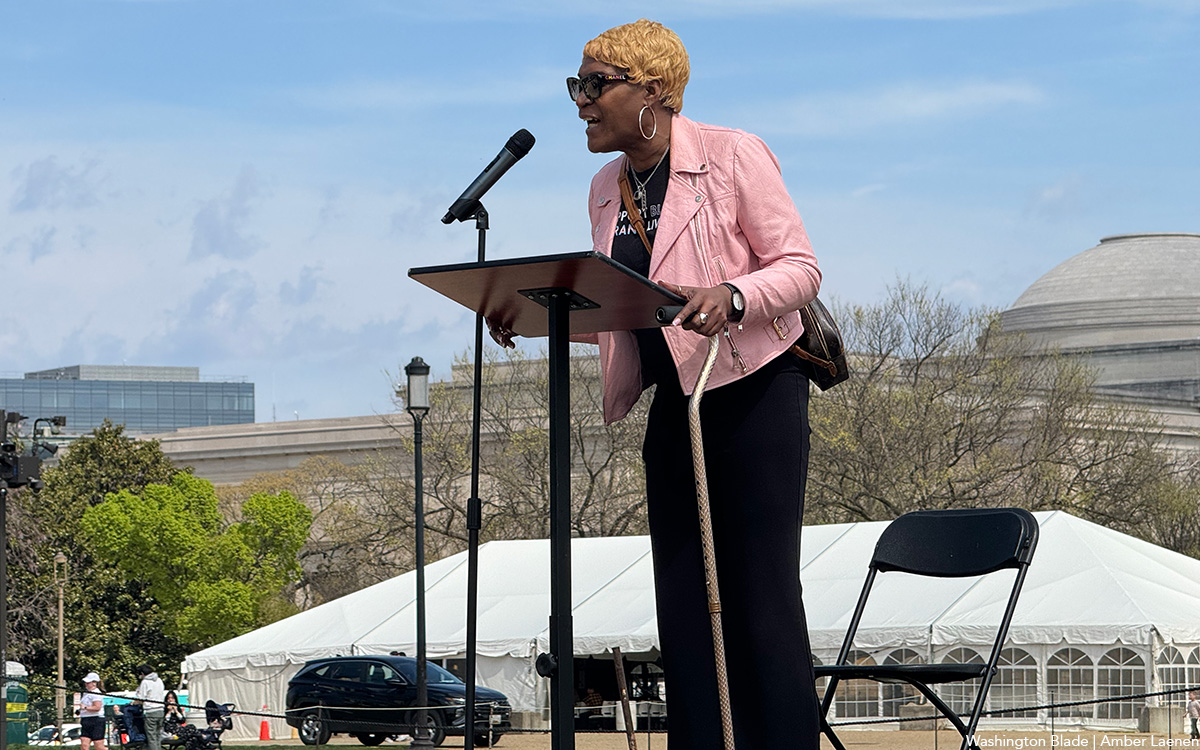
Cassils, a trans artist, also participated in the event.
Cassils presented “Etched in Light,” a Trans Justice Art Action featuring the collaborative work of more than 100 trans and nonbinary artists. Accompanied by vocal invocations and musical scoring by the ensemble Blood Is Here, the performance resulted in the live creation of one of the world’s largest cyanotype images.
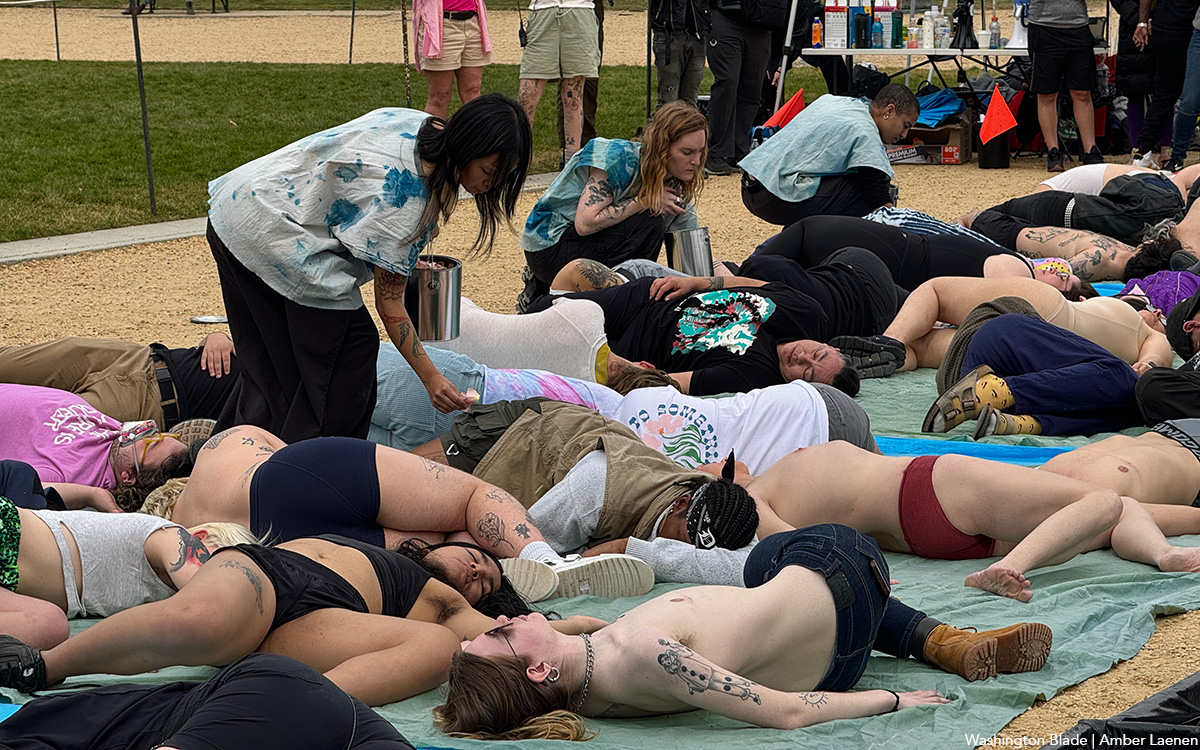
Miss Trans USA 2023 Anya Marino, who is the director of LGBTQI equality at the National Women’s Law Center, spoke with the Washington Blade about the importance of visibility for trans people.
“The fear that you’re feeling is reasonable, the fear that you’re feeling is real, and one can only respond that way, especially given the hostility that many of us are encountering every single day of our life,” said Marino. “Living openly and authentically as an act of faith. It’s an act of courage. And it’s an act of defiance against those of those in power who would do us harm.”
In addition to the TRANSform the Vote rally, the Blossom Gala took place at Hook Hall.
Monica Beverly-Hillz from “RuPaul’s Drag Race” was among the notable personalities who participated in the event. The night ended with CHERRY BOMB, an all-trans drag showcase featuring internationally renowned entertainers and local stars.
Miss Trans DC 2023 Katja Attenshun, who performed at the Blossom Gala, stressed the importance of events like these on the International Transgender Day of Visibility as a tribute to past struggles and a declaration of determination to shape the future.
“Visibility matters,” said Attenshun. “It’s a tribute to those who came before us, who fought for our rights. It’s also a statement about our determination to shape the future, to confront the challenges we still face, and to advocate for the changes we seek.”
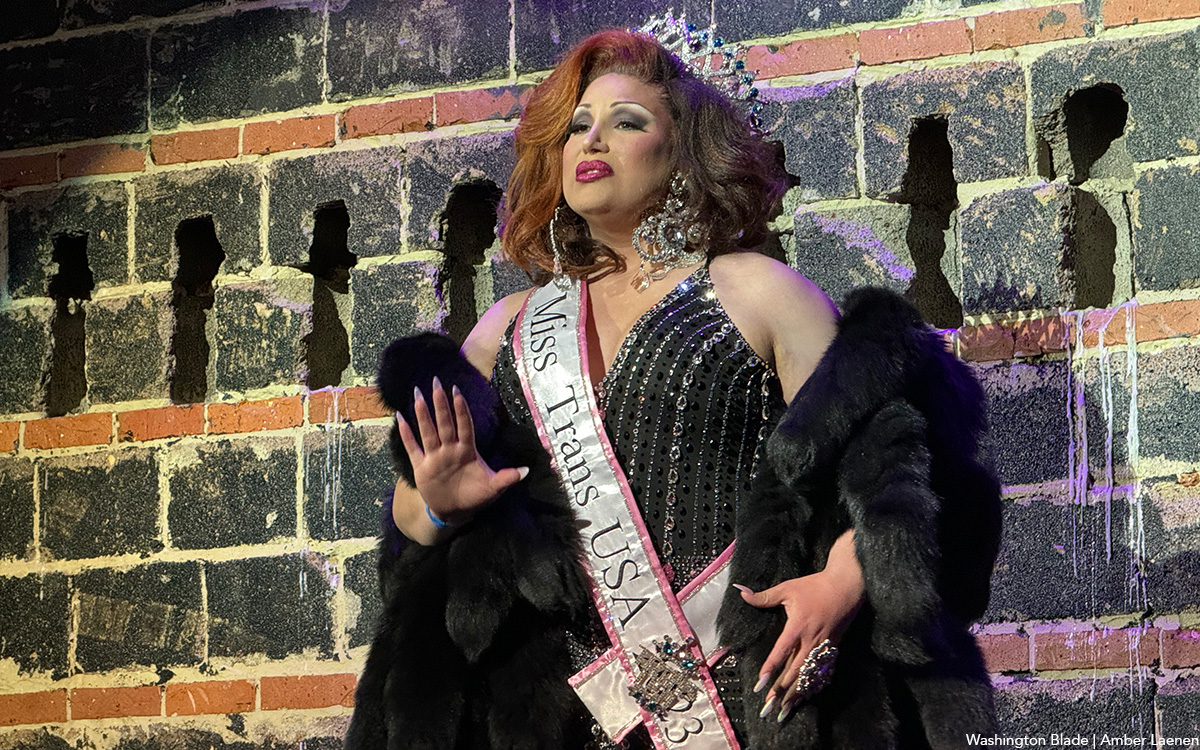
These events on Sunday served as demonstrations of solidarity within the trans community and as a call to action for continued advocacy and visibility.
“I’ve talked to so many youth, so many young adults, what I’m hearing is they’re scared, like, am I going to be able to grow up to be a trans adult? So, what I’ve been telling people is, while I’m proud of my visibility, I’m also tired, and I need allies to step up and be visible too,” said Mr. Trans USA 2023 Trey C. Michaels, program coordinator at Planned Parenthood of the Rocky Mountains.
**************************************************************************************
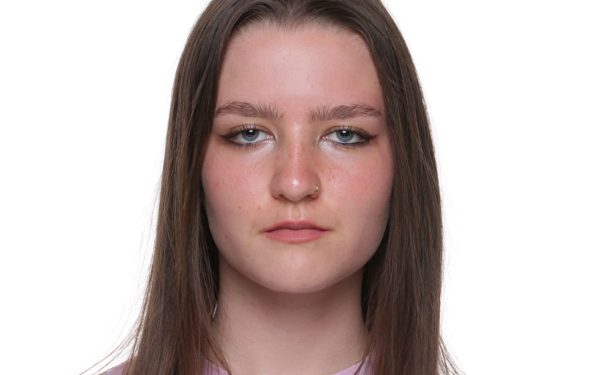
Amber Laenen is a senior at Thomas More Mechelen University in Belgium. She is majoring in journalism and international relations. Amber is interning with the Blade this semester as part of a continued partnership with the Washington Center.
District of Columbia
Detention hearing delayed in case of D.C. LGBTQ center founder
The judge ordered that the detention hearing would resume on Tuesday, March 12, when she expects to issue her final ruling
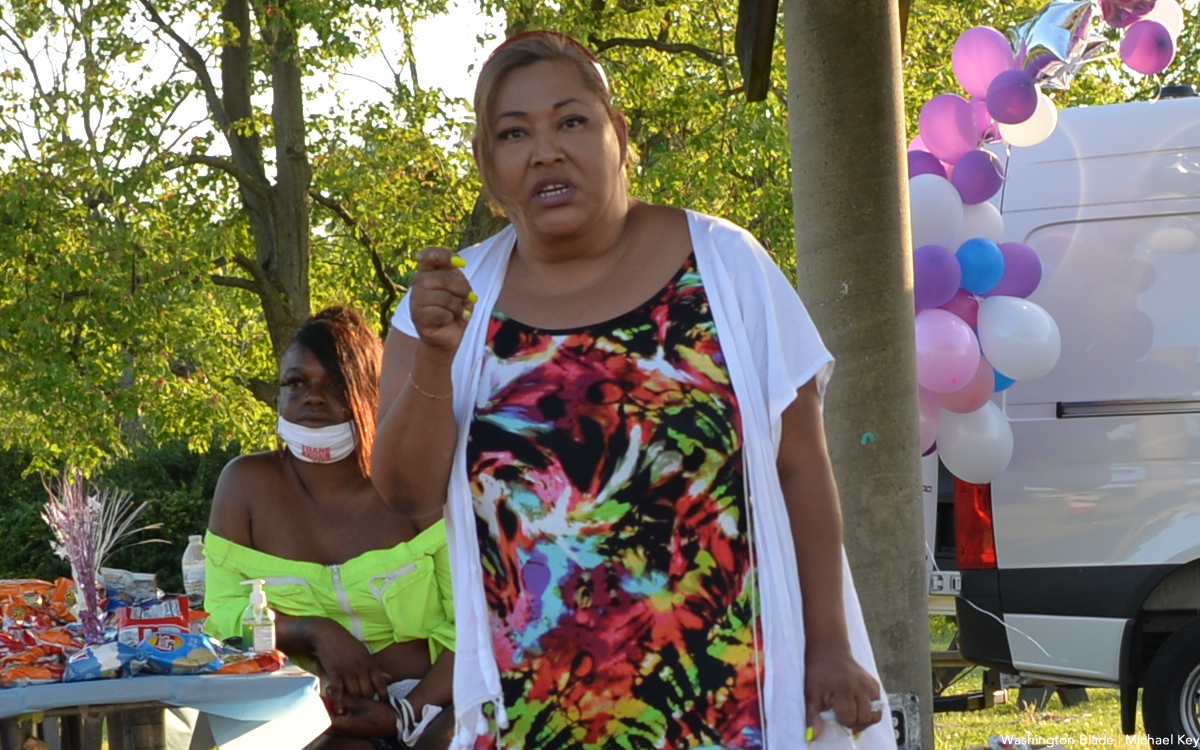
WASHINGTON – A United States District Court Judge on Friday postponed a decision on whether Ruby Corado, 53, the founder and former executive director of Casa Ruby, should be held in custody while she awaits a trial following her arrest on March 5 on multiple charges related to allegations that she embezzled at least $150,000 from Casa Ruby.
The decision by U.S. District Court Magistrate Judge Robin M. Meriweather to postpone this decision came during a dramatic detention hearing in which Corado’s court appointed Federal Public Defender Service attorney and the lead prosecutor with the Office of the U.S. Attorney for D.C. presented opposing arguments over whether Corado should be held in custody or released while awaiting trial.
Meriweather said she needed more information about a proposal by defense attorney Diane Shrewsbury that Corado, if released, could be placed in the custody of a family member in Maryland. The judge ordered that the detention hearing would resume on Tuesday, March 12, when she expects to issue her final ruling.
The judge ordered that Corado, who has been held in custody since her arrest on March 5, remain in custody until at least the Tuesday hearing.
The Friday hearing came one day after prosecutors with the U.S. Attorney’s Office filed a 12-page Memorandum In Support of Pretrial Detention that called for Corado to be detained on grounds that chances are significant that she would flee to El Salvador if she were to be released.
“Defendant Ruby Corado poses a unique and serious flight risk,” the prosecutors’ memorandum states.
It points out that the charges pending against her include Bank Fraud, Wire Fraud, Laundering of Monetary Instruments, Transportation with Criminally Derived Proceeds, and Failure to File Report of Foreign Bank Account – all related to allegations that she embezzled funds from Casa Ruby that came from at least two federal COVID pandemic relief programs.
The memorandum also states that Corado fled to El Salvador in 2022 shortly after news media reports surfaced that she was being investigated for financial improprieties and the Office of the D.C. Attorney General filed civil charges against her for alleged violations of the DC Nonprofit Corporations Act.
The March 7 memo says prosecutors believe Corado fled to El Salvador in 2022 knowing she would face criminal charges related to absconding with Casa Ruby funds.
“On February 25, 2024, the defendant returned to the United States from El Salvador,” the prosecutors’ memorandum says. “Law enforcement promptly sought the instant arrest warrant for the defendant, which this Court issued on March 1, 2024,” it says.
“On March 5, 2024, the defendant was arrested on that warrant in a hotel located in Laurel, Maryland. The defendant was alone at the hotel,” it says. “At the time of the arrest, the defendant was in possession of a passport issued by the Republic of El Salvador which had been issued on February 23, 2024.”
Prosecutors have not disclosed whether they know why Corado returned to the U.S. and how the FBI, which is leading the investigation that led to Corado’s arrest, learned of her return and her lodging at the hotel in Laurel, Md.
“Today, the defendant owns no property – not even a vehicle – in the United States,” the memorandum continues. “The defendant has no employment or other source of income,” it says, adding that Corado maintains citizenship in El Salvador. “She has bank accounts of unknown balances in El Salvador which she has failed to disclose to the U.S. government,” it says.
“And her spouse lives and works in El Salvador. The Court simply cannot be confident that the defendant will not flee the country again should the Court release her pending trial,” the memorandum concludes.
But in a court motion she filed on Friday and in her arguments at the Friday hearing, defense attorney Shrewsbury disputed the prosecutors’ claims, saying Corado would absolutely not be a flight risk. Shrewsbury disclosed that Corado returned to the U.S. last week with the intention of remaining in the D.C. area, where she has lived for at least 35 years.
The attorney said Corado came back to the D.C. area to take a job, the details of which Shrewsbury did not disclose. But the attorney said Corado has long standing family ties and many friends in the D.C. area and very much wants to fight the charges against her in court.
One more reason for releasing Corado from jail while she awaits trial is that she has been currently placed in the D.C. Jail’s male residential section under rules, according to Shrewsbury, that require inmates to be placed in a residential section based on their birth gender. This placement has endangered Corado’s safety, the attorney’s court document says.
Corado identifies as a transgender woman and for many years since founding Casa Ruby became known as an outspoken and admired advocate for LGBTQ rights. Under her leadership, Casa Ruby, as a nonprofit organization, among other things, provided transitional housing and related support services to LGBTQ youth with an outreach to transgender women of color.
However, local transgender rights advocates Earline Budd and Jeri Hughes told the Washington Blade the D.C. Jail has changed its policy and now allows transgender inmates to choose which section of the jail they prefer to be placed. Budd and Hughes, who are members of a special jail committee that reviews placement of trans inmates, said Corado was scheduled to come before the committee on Monday, March 11, to present her preferences on where to be placed.
An arrest affidavit filed in court on March 6 says the federal charges pending against Corado came about after FBI investigators learned that Corado received through Casa Ruby more than $1.3 million over a two-year period from the federal Paycheck Protection Program and the Economic Injury Disaster Loan program. Both were COVID-19 pandemic related programs.
The arrest affidavit says she allegedly stole at least $150,000 of those funds by transferring the money to bank accounts she held in El Salvador that she opened under her birth name of Vladamir Orlando Artiga Corado.
Casa Ruby shut down its operations in July 2022 after Corado’s departure to El Salvador and after it failed to pay its employees and was being evicted from its headquarters building and several of its other properties for failing to pay rent.
District of Columbia
Founder of now defunct LGBTQ center arrested on federal charges
Ruby Corado, the founder & longtime executive director of the now defunct D.C. Casa Ruby, was arrested by FBI agents at a hotel in Maryland
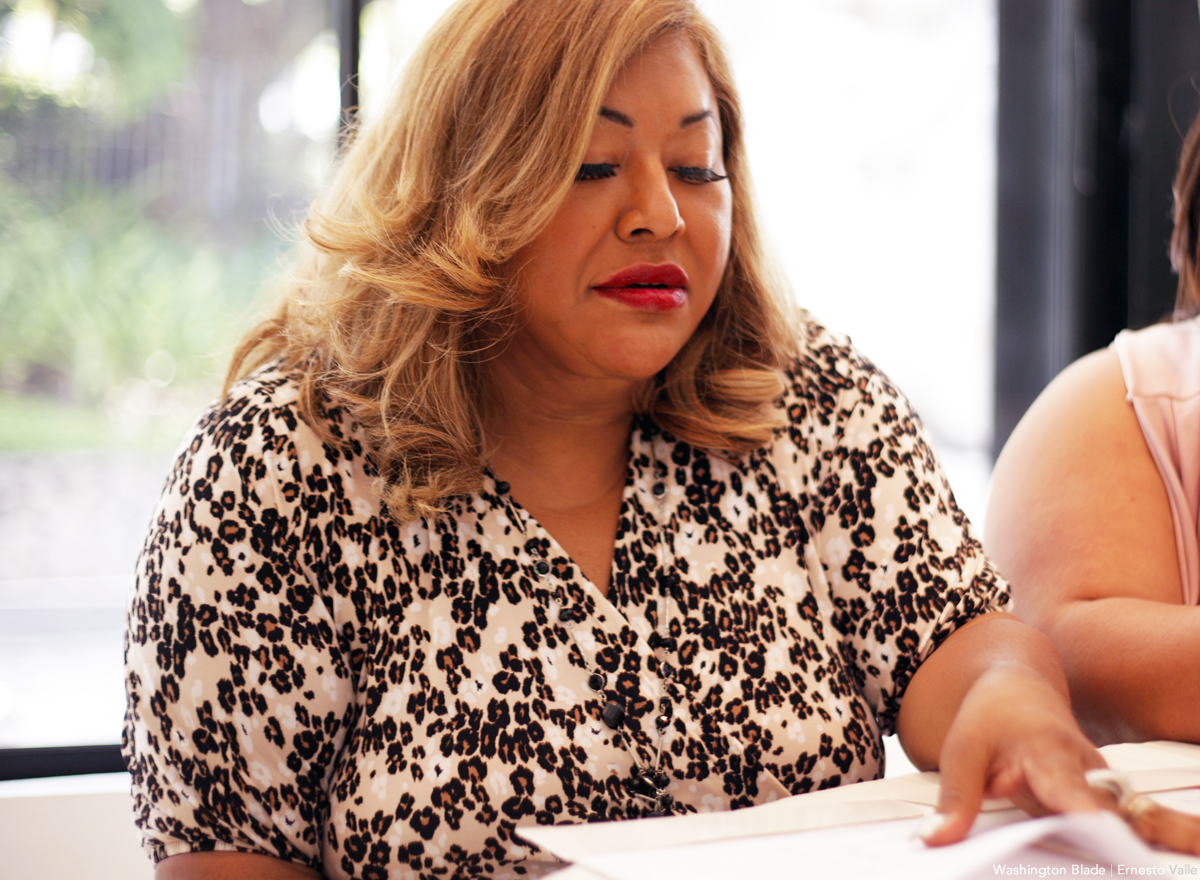
WASHINGTON – Ruby Corado, the founder and longtime executive director of the now defunct D.C. LGBTQ community services organization Casa Ruby, was arrested by the Federal Bureau of Investigation on Tuesday at a hotel in Laurel, Md., on charges of bank fraud, wire fraud, money laundering and other offenses based on allegations that she embezzled at least $150,000 from Casa Ruby before it closed its doors in 2022.
The Office of the United States Attorney for D.C. announced the arrest in a statement released Wednesday, stating that Corado was being held until at least Friday when she will appear for a detention hearing at U.S. District Court for D.C., when a judge will decide whether can be released while awaiting trial.
Corado had been living in El Salvador for at least the past two years or more following her decision to step down as executive director of Casa Ruby in 2022. Charging documents filed in federal court in D.C. on Wednesday do not say why Corado returned to the U.S., when she returned and how FBI investigators learned of her return.
“According to court documents, Corado received more than $1.3 million from the Paycheck Protection Program and the Economic Injury Disaster Loan program,” a statement released by the U.S. Attorney’s Office says.
The two federal programs were put in place at the time of the COVID-19 pandemic to assist businesses and community organizations adversely impacted by the pandemic.
“Instead of using the funds as she promised, Corado stole at least $150,000 by transferring the money to bank accounts in El Salvador, which she hid from the IRS,” the statement says. “During 2022, when financial irregularities at Casa Ruby became public, Corado sold her home in Prince George’s County and fled to El Salvador,” the U.S. Attorney’s statement continues.
“FBI agents arrested Corado on March 5, 2024, at a hotel in Laurel, Md., after her unexpected return to the United States,” the statement says. “Corado is being held pending a detention hearing on Friday.”
Patricia Hartman, a spokesperson for the U.S. Attorney’s Office, pointed to court documents for the Corado case released on Wednesday that say they were held under seal until Corado’s initial court appearance.
In addition to the FBI, the criminal case against Corado is being investigated by D.C. Office of the Inspector General, court documents show.
The U.S. Attorney’s statement points out that the charges filed against Corado are serious. Bank fraud carries a maximum sentence of 30 years in prison, wire fraud carries a maximum sentence of up to 20 years and money laundering also carries a maximum sentence of 20 years.
Among the details disclosed in a 19-page affidavit in support of Corado’s arrest filed in U.S. District Court initially under seal on March 1, Casa Ruby effectively ceased operating in July 2022 when it closed its transitional housing facilities for homeless LGBTQ youth, it had not paid its employees and was being evicted from several of its properties for failing to pay rent.
Corado was outspoken in identifying as a transgender woman and provided services for trans youth and spoke out for trans rights in her role as director of Casa Ruby. But in what may come as a surprise to those who knew her, the arrest affidavit states that Corado transferred the money she is now accused of embezzling from Casa Ruby to a bank account in El Salvador she opened using her birth name.
Corado’s arrest comes close to two years after the Office of the D.C. Attorney General filed a civil suit against Casa Ruby and Corado on grounds that Casa Ruby, under Corado’s leadership, violated the D.C. Nonprofit Corporations Act in its alleged improper financial dealings.
The local LGBTQ youth services organization Wanda Alston Foundation, which a D.C. Superior Court judge named to take over Casa Ruby as a court appointed receiver, has also filed a lawsuit against Corado and Casa Ruby’s former board members seeking monetary damages to compensate former employees and former Casa Ruby clients who lost services when Casa Ruby closed its doors.
Related story here: (Link)
-

 Arts & Entertainment1 day ago
Arts & Entertainment1 day ago2025 Best of LGBTQ LA Readers’ Choice Award Nominations
-
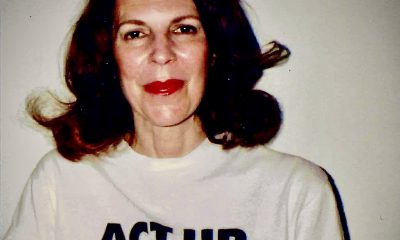
 Obituary4 days ago
Obituary4 days agoNanette Kazaoka, an unlikely AIDS activist, dies at 83
-

 Local1 day ago
Local1 day ago‘Think of those who have not been seen,’ Cynthia Erivo’s powerful message at GLAAD Awards
-

 Features1 day ago
Features1 day agoTristan Schukraft speaks on keeping queer spaces thriving
-

 Opinions1 day ago
Opinions1 day agoGay bar in California bans MAGA gear — but no other political expression — from its premises
-

 Arts & Entertainment21 hours ago
Arts & Entertainment21 hours agoTrans Day of Visibility: Let us put you on 5 Latinx musicians you should be listening to right now
-

 California2 hours ago
California2 hours agoGLAAD’s Latine Honors brings in star-studded full house
